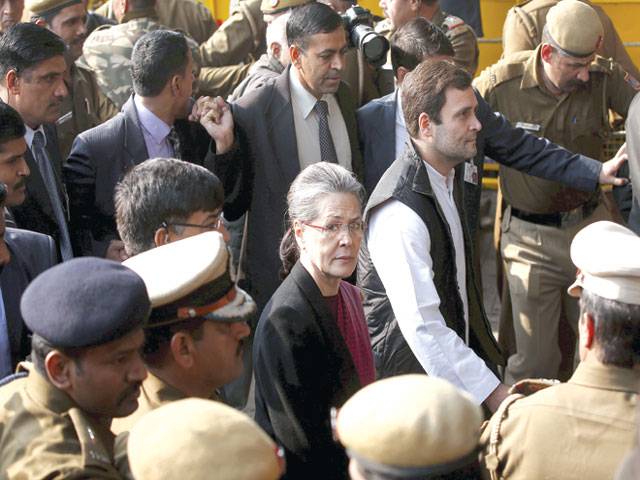NEW DELHI - A New Delhi court granted bail to opposition leaders Sonia and Rahul Gandhi Saturday in a high-profile corruption case that has gripped India, as they accused political rivals of waging a malicious vendetta against them.
The mother-son duo, scions of the famous Gandhi-Nehru dynasty, arrived at the capital's Patiala trial court accompanied by ex-premier Manmohan Singh and other senior Congress leaders, underscoring the intensely politicised nature of the case.
The Gandhis waved to their supporters outside the court where hundreds of police and paramilitaries stood guard, before entering for a five-minute hearing in which they were granted unconditional bail. "This is clearly a case of political vendetta," defence lawyer Kapil Sibal said, adding the case had been adjourned until February 20.
The Gandhis were summoned by the court after Subramanian Swamy, a politician from the ruling Bharatiya Janata Party (BJP) filed a private criminal complaint accusing them of misappropriating property belonging to the now-defunct National Herald newspaper.
They fiercely deny Swamy's allegations, which they say are evidence of a Prime Minister Narendra Modi-led campaign against their embattled party, struggling since a bitter electoral defeat last year.
"I have no doubt that the truth will come out. We are well aware of the campaign of attacks and criticism that our political rivals follow," Sonia Gandhi said at a press conference following the hearing.
"They are targeting us and making full use of the state agencies," she said.
The BJP rejects any suggestion it is involved in the case, saying Swamy acted alone and stressing the court's independence.
The Gandhis were granted bail on a personal bond of 50,000 rupees ($754) each, their lawyers said, with Sonia's daughter Priyanka Gandhi and former defence minister AK Antony providing sureties. Three others accused were also granted bail.
"The Congress party is united in support of (Sonia and Rahul). We will give a determined fight," former premier Singh told reporters. It followed a tumultuous week in Indian politics which saw members of the embattled Congress and their allies throw parliament into chaos several times in protest at the case.
The intensifying spat between the main parties looks set to stall the progress of a landmark sales tax reform in parliament.
Separately, Modi clashed with Delhi chief minister Arvind Kejriwal, head of the anti-corruption Aam Aadmi Party (AAP) after federal investigators searched the city administration's headquarters, with Kejriwal branding the premier a "psychopath".
The AAP in turn caused a storm by accusing Finance Minister Arun Jaitley of presiding over financial irregularities when he controlled the capital's cricket association - a claim he vehemently denies.
Swamy first filed the case against the Congress bosses in 2001. He accused them of illegally acquiring the now-defunct newspaper's assets after buying its publisher through a new private company, Young Indian, using a loan from party funds.
He alleged that the Gandhis aimed to grab property worth $332 million owned by the publishing firm, Associated Journals, using fraudulent papers. Both Gandhis are directors of Young Indian, owning a 76-percent stake in it and the remaining shares.
Sonia and Rahul were first summoned in the case in June 2014 but refused to appear in court in person, sending their lawyers instead.
On December 7 Delhi High Court turned down a plea by the Gandhis to quash the latest summons and exempt them from appearing in person. The National Herald was founded by Jawaharlal Nehru who went on to become India's first prime minister. It first published from the northern city of Lucknow in 1938 and played a prominent role promoting nationalist sentiment before India's independence from Britain in 1947.
Sonia Gandhi, widow of Nehru's grandson Rajiv, later became the chief patron of the trust that ran it. But dogged by bad management, poor circulation and falling revenue, she finally decided to close the publication in 2008.
Sunday, May 19, 2024
India court grants bail to Gandhis in graft case

6:57 PM | May 18, 2024
Sports & Genocide
May 18, 2024
Healing AJK
May 18, 2024
A New World Order
May 18, 2024
Tobacco Toll
May 17, 2024
Rushed Reforms
May 17, 2024
Continuing Narrative of Nakba
May 18, 2024
Teacher Struggles
May 18, 2024
No Filers out of Reach
May 18, 2024
Hoax of Inflation Coming Down
May 17, 2024
Rising Inflation
May 17, 2024
ePaper - Nawaiwaqt
Advertisement
Nawaiwaqt Group | Copyright © 2024





